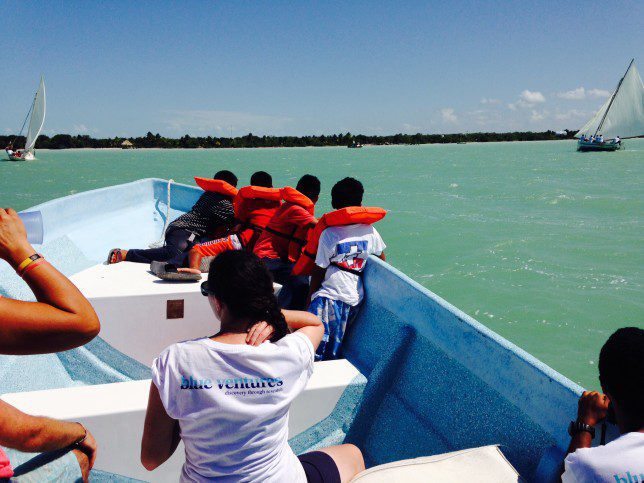by Silvia Parmeggiani, Community Officer, Belize
Every year, as April begins, something changes in the village of Sarteneja. It is a slow change at first, but quite noticeable if you have lived here some months. Firstly, the fishermen return to their houses, as the lobster season closes and the best of the conch catch has passed. Aside from spending some well-deserved time with their families, many fishermen use the time to fix their boats, and use the money they have earned to spruce up their houses;; the whole village starts looking like a building site. As we near Easter, the school vacations also begin, and kids fill the streets and gardens of their houses. Little paddling pools appear, and children’s voices and music fill the air from morning to sunset every day of the week. The bars and restaurants also fill up, as well as the hotels a few days before Easter Sunday; it is not only the Sartenejans filling their home town. Friends and family from around the country come and visit, houses fill up with relatives, in-laws, older children who are studying abroad or are working in the cities. But why is everybody here, in this small village next to the sea? It is Easter everywhere in Belize of course, but Sarteneja is well known for its Easter sailing regatta.
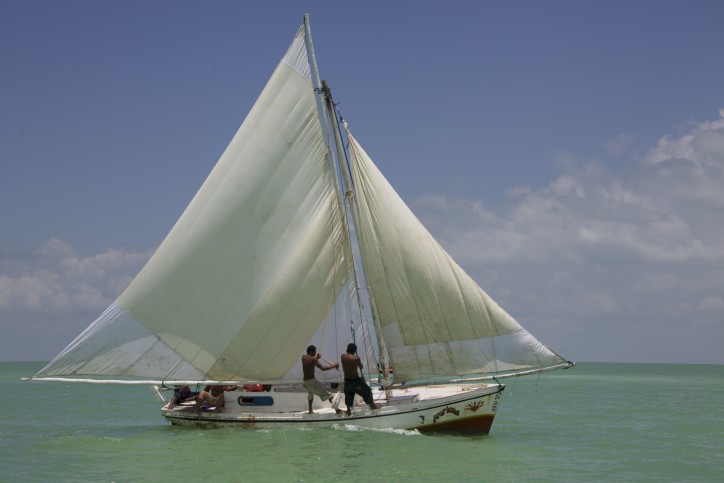
The fishermen on their boat, during the Regatta, racing for the big prize
This is a once in a year party in which the main event is the sailboat races. The idea comes from the will of giving the fishermen an opportunity to show their sailing skills to their families and friends, who never see them as they go and fish all along the coast of Belize. The majority of Sartenejan fishermen, in fact, go out on their traditional, hand-built, wooden sailboats and sail south, staying out at sea for over a week at a time. When they reach their favourite fishing spots, fishermen freedive to catch lobster and conch, the two main fisheries of the country. They only come back after they have sold their catch, mostly in Belize City, where they moor their boats and come home by bus, rest a few days, and head back.
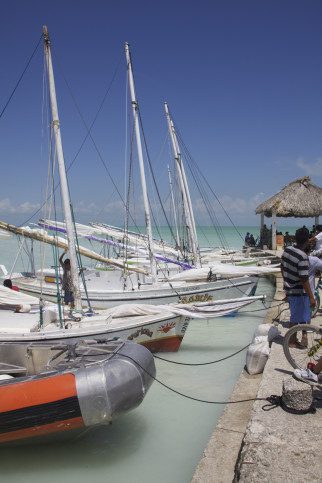
Along the main pier the boats are lined up and ready for the Regatta
Around this main event a whole village fair is born; stalls with food, drinks and games line the coast, whilst contests, from the more typical greasy pole, breath-holding and dancing competitions, to more original ones like watermelon eating, are held throughout the day. This year our expedition manager, Shawn, to the cheer of “Go, Gringo!”, won the swimming contest! While all this is going on, we also have a Blue Ventures booth. Of course, we could not miss this opportunity to display our work and inform about our projects. With the amazing artistic ability of our volunteers, we decorated the stall, the creativity of our field scientists helped to prepare educational games for adults and kids, and the ability of the local women contributed by teaching us all to prepare delicious lionfish dishes.
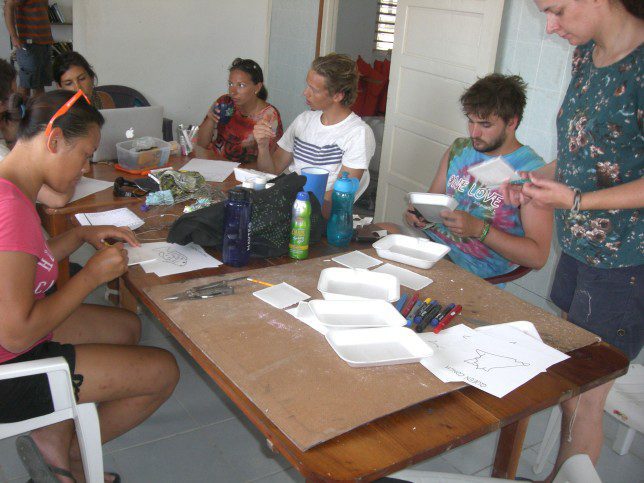
Volunteers and staff busy preparing the materials for the activities and games that will be held at the booth
We have chosen three traditional dishes and transformed them from ensalada, ceviche and empanadas to lionfish, lionfish and more lionfish! It is incredible how this fish is so adaptable to different preparations, as much as it is beautiful to see and dangerous to the reef’s ecosystem, I must say it is equally good to eat! Although some still need a little convincing, Sartenejeños by now are accustomed to eating lionfish. Almost everybody has heard of the many ways lionfish are harmful to Belize’s sea, but still not all know about the simple solution we are promoting. I am sure some thought it was a joke at first, “Oh, no it’s poisonous!” they assure me, but when they witness the fish ready to be served, they agree to give it a try. After that first bite, I need to convince them no more: the lionfish’s taste does the rest of the job.
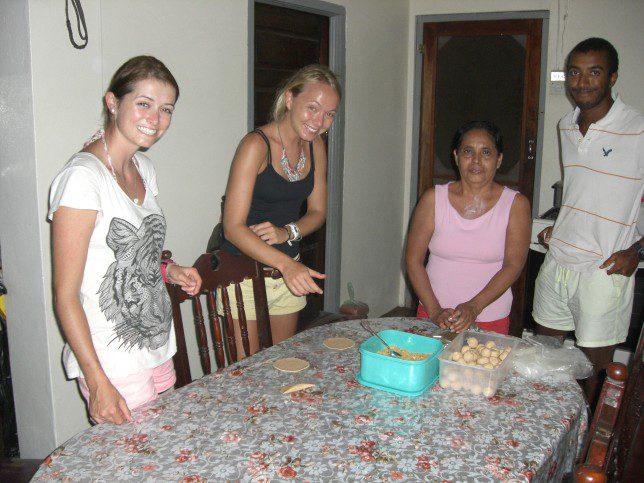
Volunteers Gill, Tom and Sophia with a Sartenejan woman who kindly teaches how to make the flat, round, ready to fold-over corn dough for empanadas
We have also been working on giving an extra incentive to the fishermen and add value to the fish, which otherwise just seems to them a more complicated and dangerous catch. Even if most understand the potential threat of leaving the lionfish to thrive on the barrier reef, a menace to their own livelihood, humans all around the world tend to look at their own immediate benefit first… and why go and risk getting stung by the venomous spines of this new fish? Well, if those spines themselves could be given a value, it would surely make it more encouraging and economically sustainable. As beautiful as they are decorating the fish itself, the long spines and the wide fins and tails look stunning when transformed in earrings by Belizean jewellers. No woman can pass in front of our stall during the day and not stop to admire these original, hand-made, pieces of artwork.
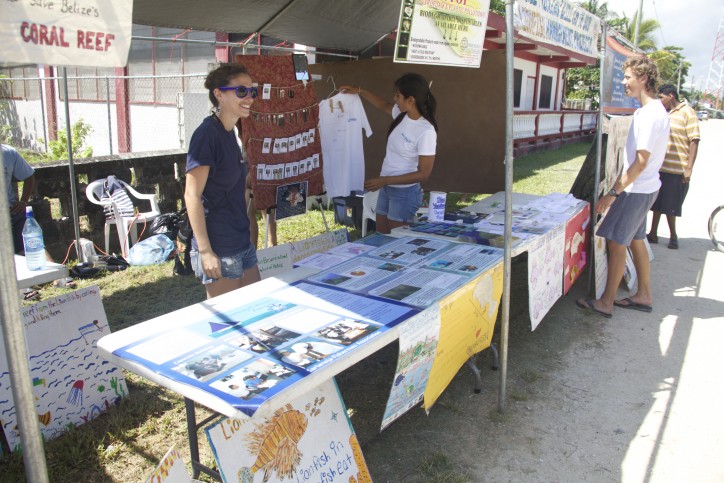
A big thank you goes to the artisans: Khadija Assales, Palovi Baezar and MayaPetrona Hun, who sent us their beautiful earrings to sell at our booth
On the other side of the booth, our volunteers are busy with a multitude of kids, for the smallest we have a colouring game, in which they have to choose between positive and negative actions and demonstrate their love for the coral reef by filling in with light and dark colours this sweet sign.
For the older children we have prepared a “Marine Crossword” with different levels of definitions, while the easiest words are quickly filled in, a group of smart and enthusiastic kids decide they want to win the big prize. As they don’t know the answer to the difficult definitions we have prepared, they use their curiosity and roam around the booth looking for the answer, presuming it must be written somewhere. During their search they stumble into Jen, giving information to passers-by and start questioning until they get the answer they are seeking. Well, we must reward this show of passionate research skills! The big prize is a trip on our boat, which, while we are busy on land, serves the judges during the Regatta.
-

The four children on the boat, enjoying the close-up view of the sailboat races.
Everybody’s favourite is the fishing game, evidently! It appeals to small and big alike, and a crowd quickly forms. They come back again and again, wanting to play over and over and win more every time! The fun makes it stimulating and once interested we know children are much more resourceful than what many realise. They will find their answers, once their curiosity is triggered and they have access to information, they will learn by themselves and this is the kind of teaching which they will hold on to the longest.
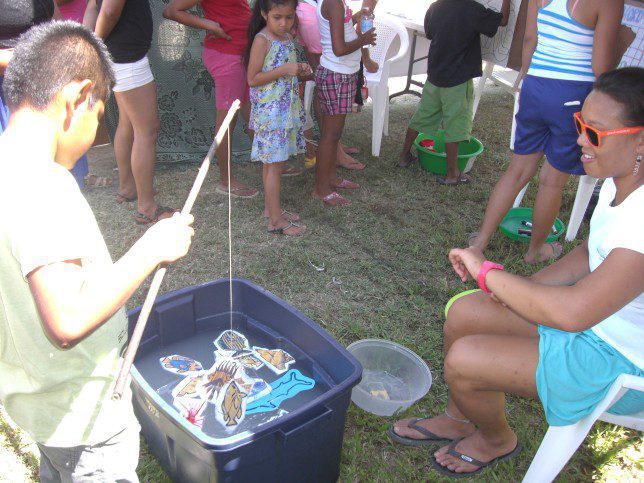
Our volunteer, Casey keeps the time while a young participant has to quickly decide which fish he will go for
At the end of this long day everybody is exhausted, but happy. The lionfish ceviche, our best selling dish, has vanished. As we start packing up, we all have one last empanada each, and even one of our vegetarian volunteers decides to try this environmentally friendly fish dish! Our reward is awaiting us tonight… after going home for a rest, we all head to the dancing party. It is great fun and so amazing to see our little isolated village alive with music and people. Everybody is out; I meet the principal of one of the primary schools with his daughter, many of the homestay moms come to dance with us, wave to some fishermen from the lionfish safe-handling workshops we held earlier this year.
Unfortunately, like after every party, someone has to clean-up the following morning. Also, this year we managed to use only biodegradable materials for selling the food, and we also provided biodegradable cups for the village council’s bar. Nevertheless, we decide to demonstrate that our love for the environment goes all the way, and on Monday we set out with our biodegradable garbage bags and give our contribution to the cleaning-up.
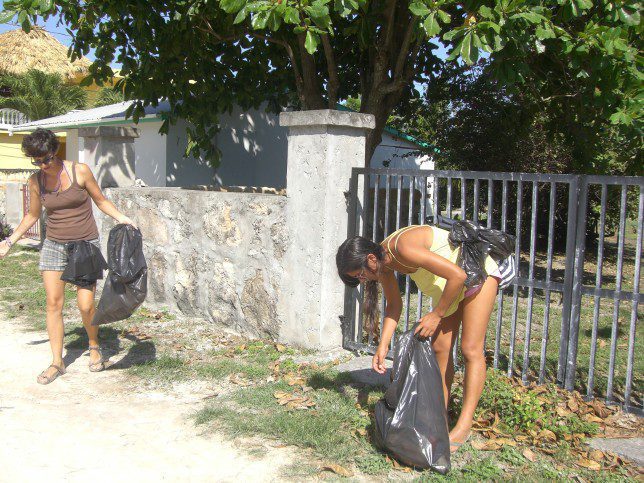
Meira and I find lots of Styrofoam, empty bags of chips and plastic soft drink bottles


